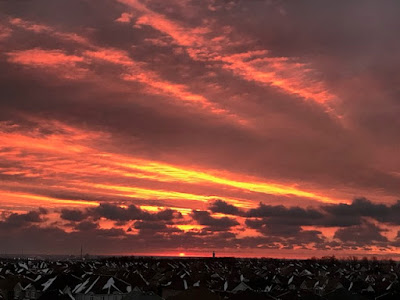The Memories We Carry in our Bodies
Thirty years ago I was awaiting a baby being born. I’d baked some peanut butter cookies that evening (the nesting urge kicking in). Later, I called my OB-GYN about spotting.
“How much?” she asked. “About a tablespoon,” I said, perhaps my mind still attuned to baking measurements. “That’s a good description,” she said. “Nothing to panic about, but I think you should go to the hospital.” And so on a snowy February night, we drove the short distance to the nearby hospital. Over 18 hours later, on February 29th, our daughter was born.
I was a nervous, anxious, new mother, worried the baby wasn’t latching on, wasn’t peeing enough, sleeping enough, all the common anxieties of new motherhood. I learned, I grew into it, my baby and I absorbed the ways of each other. Our minds may forget those early days, the birthing, the angst, the sleepless nights, the countless small moments of wonder and joy. But I think our bodies remember.
We carry our memories in the cells of our bodies. They say we also bear the memories of our ancestors in our bodies. I don’t know about that. But I do think we do carry with us all the powerful emotions we have experienced through our lives. They are buried within us. They’re part of us forever.
What happens to those who suffer from dementia and Alzheimers? Even though, on the outside, it may appear that they have forgotten, do they still carry those memories buried in their bodies? Do parts of them still know what they once held, who they once held?
In the past week there have been a series of coincidences where Alzheimers has been cropping up.
First, the mother of a childhood friend passed away. She was our downstairs neighbour in Bahrain, a kind, gentle, soft-spoken woman with a marvelous singing voice. I attended her funeral on Friday and as I sat in the pews, a memory resurfaced. Sometimes when I was helping my mother in our apartment kitchen, in front of the open window, we heard singing wafting up from the open window below ours. “Listen, “my mother said, “Auntie Dinky is singing.” She would have been in her own kitchen, chopping onions with her rapid-fire precision. She made the most delicious sannas (steamed rice cakes) and always sent a platter of them upstairs because she knew our family loved them. Many years ago she started down the path of dementia.
The other night I came across Lisa Raitt (former conservative MP) being interviewed by Steve Paiken on The Agenda. Raitt’s husband showed signs of Alzheimers at an early age, in his mid-fifties.
Early onset of dementia is defined as starting before the age of 65. After a certain age, we worry when we forget where we put our keys, or can’t recall a word or name. It’s frightening to think that perhaps this disease is in our future. But who hurts more, the Alzheimers patient or the family? I would think it’s the family. I hope the Alzheimer patient is happy, perhaps running through a meadow they remember from their youth, feeling the wind on their face, that memory they carry in their cells.
The coincidences continued. Driving in my car, CBC radio on, I listened to an interview with Steve McNeil who had skated for 19 hours 26 minutes in the frigid temperatures of winter to raise money for Alzheimers. The 1926 ( link here ) fund-raiser was in honour of his mother (born in 1926).
On Instagram, one of the writers I follow, posted that she would be reading from her book on caring for a parent with Alzheimers.
A weekly list of blog clips led me to a post by a woman who is caring for her husband with Alzheimers.
I didn’t know what to make of all these coincidences cropping up in the space of a few days. I still don’t. It’s enough to just remind myself that we carry all this within us, our lives, our emotions, happy memories, painful ones. We can’t just push certain ones away and keep the rest. They’re all part of the whole, part of our story.
Thirty years ago my body gave birth, my angst as a new mother morphed into an abundance of motherhood experiences that I carry with me, forever embedded into my cells.
Thank you to the one who made that possible.



Comments
Post a Comment